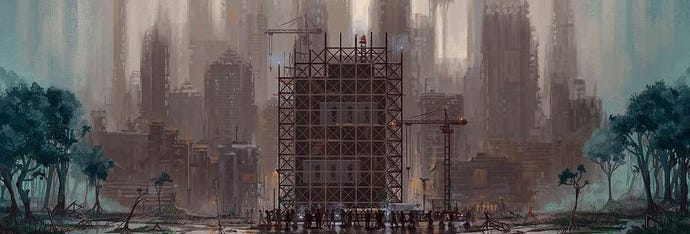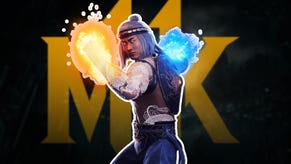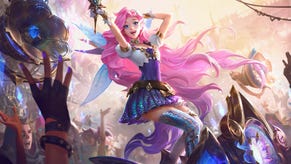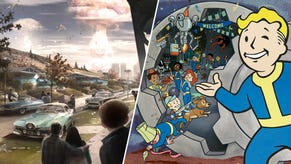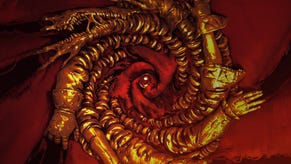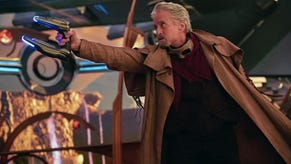Oscar: tackling the common problems we all face growing up
Oscar stars a young girl who enters an imaginary world to escape the hardships of youth. Dave Cook speaks with developer Team Sharkeye about the unifying experience of growing pains, and the increasing depth given to child protagonists today.
”Like sand in an oyster, or turning coal into a diamond, Oscar being trapped with her problems turns her surroundings into a painfully beautiful adventure. It’s not my story, but one I feel strongly should be told.”
There's few things as exciting and terrifying than crossing the apex of youth. As children we often yearn to grow up and savour the many freedoms enjoyed by adults. How many of you looked on in jealousy as your older sibling got to stay up late while you were forced to toddle off to bed? How many of you recall the annoyance that comes with being too young to smoke or drink, and how many of you simply couldn't wait to leave school and enter the real, grown-up world?
Most of us get our wish, only to find that being an adult isn't exactly the dream ticket we once thought it to be. Grown-up responsibility, self-preservation and work are things that keep many of us awake at night, making us wish we could just step back into youthful ignorance for just a day, if only to attain some sort of respite from the rat race. The passing of years comes to us all. It is a theme universal in its appeal.
Several recent games have conveyed the subject of impending adulthood with great effect, such as The Last of Us DLC Left Behind, Beyond: Two Souls and TellTale's The Walking Dead series. They each establish young protagonists who live in worlds that force them to grow up too fast, and to let go of their innocence well ahead of their years. They are complicated individuals with their own aspirations, hopes and fears, standing counter to the majority of bland, stereotypical child characters in gaming today.
Oscar is another game to be added to this list, except it is neither set in a post apocalyptic world, nor about telekinesis. It's the story of a young girl and her plushie elephant Flynn, venturing into the world of make-believe to escape the harsh reality of real life. Escapism is a vital component in our growing up, after all. It's the reason cardboard boxes can become grand forts, or why we treat the carpet like hot lava as we scramble over furniture to avoid getting burned. This is a game each of us - regardless of gender, race or creed - can relate to.
"Every kind of person, especially youth, will face problems they can't explain, parts of them that will fail to be acknowledged by other people," Oscar designer and composer Josh Long says. "We all feel this every day when someone asks how we are and we answer 'I'm fine' when we're really not. That's why I think Oscar's story is effective, because while it recounts personal events, somehow we can all relate.
”I think we’re all intrigued at transposing adult qualities and experiences onto a young character. It creates sympathy and empathy, because we can take angles that have already been explored in games but apply them once again to a new type of character whose qualities we can all relate to – being younger.”
"It doesn't force you to feel a certain way about it - Oscar's story merely helps clarify feelings we've all had about unspoken problems and how they continue to exist. Kind of like how Metal Gear Solid is obviously an account of fictional events, but gives an inside view of how politics and war fit together. It touches us because it shows us more about how the world works, even if it's sad sometimes.
"For me one of the roles of art is to turn the ugly experiences of being human into something beautiful that people are willing to absorb. Strangely enough, kind of like sand in an oyster, or turning coal into a diamond, Oscar being trapped with her problems turns her surroundings into a painfully beautiful adventure. It's not my story, but one I feel strongly should be told. Even if the kickstarter or game don't succeed, even letting a few people know about this story means a lot to me, and hopefully to this person who had their problems ignored growing up."
Oscar's alternative to speaking up about her problems is to regress into the world of imagination, and Long explains that this theme was fuelled by our reluctance to burden others with our troubles, something that is accentuated by the fact that children have greater difficulty articulating their problems. The same is true for those among us who have suffered at the hands of a bully, and have found it difficult to come clean. Long explains that being bullied is a delicate theme touched upon during the game.
"For many decades this was considered a trivial issue because one would expect that kids can just speak up to authorities and have the perpetrators punished," he says. "But how are they punished? Usually just a slap on the wrist or a few hours in detention. Those same bullies show up the very next day in search of who got them in trouble, and here we have a very real dilemma: Stay quiet and take it, or speak up and draw more bullying to yourself. Personally I've never experienced this, and having to research what this experience does to people hasn't been very enjoyable."
Team Sharkeye will take players to a variety of whimsical abstract worlds that mask Oscar's deeper issues, but Long stresses that its important that there's still a game beneath the pathos and ingrained themes. It's a platformer first and foremost, coupled with light puzzle, stealth and perspective-shifting elements that refrain from distracting players from the visual cues around them. Evidence that Oscar's reality is catching up with her could be anything from a stark, red phonebox in a lush forest, or a blue school bus half-buried in the desert sands. They're clues that all is not as it seems.
"The challenge is moving forward and surviving," adds Long. "The puzzle the player solves as the mechanics shift from 2D platformer, to 2.5D anti-stealth, to controlling the environment around Oscar while she moves of her own will, is what's really ailing Oscar's life. That's the question we place on the player's mind, slowly but surely to answer."
Oscar's announcement trailer begs several questions. There are odd instances in most scenes, such as a strange light-bearing creature shuffling through a school hallway, and the image of a young girl - possibly Oscar herself - climbing a vast construction site while a crowd of pedestrians look on from the streets below. There's a mystery here that invites players to ponder the subtext, and that's certainly an alluring hook. I asked Long for his thoughts on the best way to create a deep child protagonist and to reflect on some key examples seen in recent games.
"Part of making this game is believing in something that’s maybe a bit out there for most people, if not in terms of narrative, at least in terms of what a game could provide for people. I want to learn to trust my own judgment and know that I’m not just blindly walking another ‘successful’ road to dissatisfaction.”
"I think as our capacity to explore different kinds of games effectively is slowly growing, there's no reason we can't explore all sorts of interesting character archetypes, much like film, TV and novels do," he says. "I think the average, muscular male protagonist was simply the easiest starting point. Coincidentally, as a developer I hardly have the time to play games but this past Christmas [The Last of Us and The Walking Dead] were the two titles I elected to play.
"I greatly enjoyed both, and certainly as both games touch on fundamental aspects of growing up it was pleasantly relatable. Strictly speaking from an art perspective I think we're all intrigued at transposing adult qualities and experiences onto a young character. It creates sympathy and empathy, because we can take angles that have already been explored in games but apply them once again to a new type of character whose qualities we can all relate to - being younger - yielding great results so far. Don't you think?"
Child characters need not be shallow window dressing for town hub scenes, or the spooky kids you see in games like F.E.A.R. or Silent Hill, although they are far from examples of poor characterisations. The idea that all kids are simple, innocent and incapable of tackling adult issues is waning, and it's interesting to see recent games tackle the idea of growing and accepting responsibility where there was very little before.

"Personally I had a lot of tough experiences growing up," recalls Long. "Not in that they were more outright difficult than anyone's - I'm alive and a video game developer with enough resources to take a risk, I keep it in perspective - more that they went largely accounted for. I was the A student on several sports teams, in programming competitions, spelling bees, performing in music festivals. I hung out with the loners as much as I did the popular kids. I did what everyone told me, believing that it would make me successful and happy. I look back and remember that on paper, my life should have been near perfect.
"Of course it wasn't the case, but no one around me would ever hear a word of complaint about me being unhappy, especially those I trusted most. Everyone felt my life was so good that I couldn't possibly have issues, and part of it was my fault for eventually just learning to keep up that image, really because I didn't think there was another way out. I hid it pretty darn well and I think most people in my hometown still don't know how the rest of my life played out. They probably assume I'm still that same guy.
"Anyways, I paid a pretty heavy price in my day-to-day life for having lived 20 years or so in such a dysfunctional manner, so I relate very closely to people whose problems are just a little bit too atypical or complicated to be heard. Part of making this game is believing in something that's maybe a bit out there for most people, if not in terms of narrative, at least in terms of what a game could provide for people. I want to learn to trust my own judgment and know that I'm not just blindly walking another 'successful' road to dissatisfaction.
"It's a huge personal risk more than anything, but one I feel I've already succeeded in surviving; If it's about the journey, this one's been life-changing so far."
Oscar is in development now for PC. Stay tuned for more updates as they come over at the Kickstarter page.
